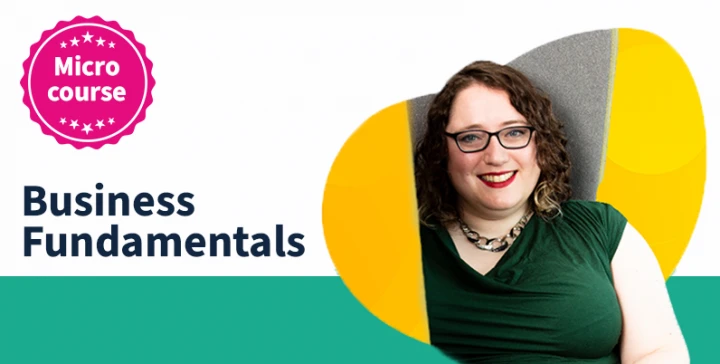37 digital marketing terms you need to know

Whether you’re flying solo or leading a team, use this resource as your quick reference guide to small business marketing.
Terms are listed alphabetically, so feel free to whizz up and down the list to find what you need!
Average Order Value
The amount your customers spend on average in a single transaction is called ‘Average Order Value’. If some customers spend a little, and others spend a lot, your AOV will be somewhere in the middle. For ways to encourage customers to spend a bit more and nudge that AOV up a bit, take a look at this business advice article from Transmit Startups:

How to seize upselling and cross-selling opportunities.
(Even when customers are spending less.)
Backlinks
A backlink is a link created when one website links to another. Backlinks are also called "inbound links" or "incoming links." If you create content that promotes another company’s product or service, or references their content, they may be willing to provide a backlink to your site.
Having backlinks helps more people discover your business and is an effective way of improving your ranking on search engines.
Call-to-Action
After spending your precious time and energy creating marketing content for your customers to read and engage with, you’ll want those people to DO something afterwards!
This might be signing up for more marketing emails, liking or following your business page on social media, or clicking a particular link which takes them to a page where they can book an appointment or make a purchase.
By embedding calls-to-action (CTAs) into marketing content that is helpful or informative, you can promote your products and services and increase sales - all while building trust and authority at the same time.
Click-Through Rate
The percentage of people who click on a link or a button on your website, a social media post, or in an email you’ve sent them, is called the Click Through Rate. It’s often abbreviated to CTR by marketers.

Getting Started with Email Marketing
Email marketing and top tips for using digital media.
Listen to a fellow entrepreneur talk about how they built up their email subscriber list.
Content Management System
If you’re managing the content of your own website, you’ll be using a content management system (CMS) already. If you’ve outsourced this particular aspect of running a small business, the person who takes care of your site will use a CMS to publish new content, make changes and ensure the pages are linked together in a structure that makes sense for the use (see UX).
Conversion Rate
How frequently a person who interacts with your business actually makes a purchase can be described as the ‘Conversion rate’. For example, if 50 people visit your website in a day, and five of them “convert” into paying customers, you’ve got a 10% conversion rate (which is pretty awesome by the way.) Take a look at SEO and CRO to find out more about turning clicks into conversions.
Cost Per Click (CPC)
If you’re paying for advertising on an e-commerce platform like Etsy, you’ll be charged a small fee each time a customer clicks on your ad/product/business page and then goes on to complete a purchase. It can be tricky to work out what to spend on advertising, so you may need to set aside a bit of your marketing budget for experimentation, and be prepared that valuable learning sometimes comes at a cost! Once you’ve tried Cost Per Click (CPC) advertising for a few months, you’ll be able to make a decision about whether you want to continue or invest your advertising spend somewhere else, such as social media (where you can do a lot for free!)

Customer Relationship Management (CRM)
Customer data is precious to marketers and small business owners. You’ll want to collect it and store it somewhere super safe, both from a data protection point of view, and as a way of targeting customers with products and services that are suited to their specific interests and demographic details.
There are lots of CRM software options designed to help you manage and analyse your customers’ data and the interaction you have with them.
We like Capsule, who you can find on the Smarta Product Marketplace.
Daily Active User (DAU)
A user who visits your website, likes your social media content or clicks on a link in your marketing email EVERY DAY. (These people do exist.)
Direct-to-Consumer (DTC)
Whether you’re a butcher, a baker, or a TikTok video maker, if your small business sells something directly to the people who will use it (without an intermediary), your business model is Direct-to-Consumer.
This means your marketing is B2C (business to customer) rather than B2B (business to business). Thanks to ecommerce platforms like Amazon, eBay and Etsy, reaching customers and selling to them directly is easy to learn and can bring in those satisfying sales quickly.
Email Service Provider
A company (such as Hubspot, Mailchimp or Moosennd) that provides a platform for you to send marketing emails and collect data on what users do with it, such as open it, read it, click on a link or unsubscribe.
Funnel
The marketing funnel describes the journey a customer takes (travelling down the funnel from top to bottom) from when they first encounter your business to when they convert to a paying recipient of your product or service!
Google Analytics
Just as the brand name Hoover became the word used to describe all vacuum cleaners, Google has dominated the search engine space, so much that we often say “Google it” when we mean “search the internet”!
Google offers a free web analytics service which allows you to track and report your website traffic, including the number of visits to each page, time spent on each page, and where those visitors have come from (organic search, social media, or a paid advert). This data is hugely valuable to you when designing or improving your marketing strategy.
Go-to-Market
When you created your business plan, you should hopefully have included some ideas for getting your product or service out there and seen! This is the basis of your Go-To-Market strategy.
Ideal Customer Persona
A tried and tested way of reaching your target audience is to take the time to write a detailed description of who they are, where they hang out, and what they’re likely to spend their money on. Try to include demographics (a customer’s age, gender, location) and psychographics (attitudes, interests, personality, values, opinions, and lifestyle). This helps you focus your marketing efforts and attract the type of people you want to engage with your business.
Key Performance Indicator KPI
Team Smarta and our colleagues at Transmit Startups use KPIs to track and measure the success of our goals and objectives. A nice way of putting it is deciding, or agreeing as a team, “what does good look like?” As you work on the marketing strategy for your business, you may find it helpful to talk through your KPIs with a mentor or business coach.

Landing Page
These are pages of your website that customers will “land” on when they click a link from a search engine, a marketing email or a social media post.
A landing page is like a digital shop window - it needs to look attractive in order to encourage visitors to come inside and explore.
Lifetime Value to Customer Acquisition Cost (LTV:CAC)
Getting customers to engage with your brand and buy your products and services usually requires some investment, which is referred to as the Customer Acquisition Cost. The amount that person (or other small business) spends with you, over the months or weeks they remain a customer, is their Lifetime Value. You’ll probably want to work out how much money you can make by keeping a customer long-term, divided by the cost of getting them onboard in the first place.

Upselling and cross-selling
LTV will help you decide whether to focus more on finding new customers, or concentrate on marketing to your loyal fans and returning visitors!
Monthly Active User (MAU)
A user who’s still fairly engaged and can be relied upon to browse your site and engaged with your awesome content roughly once a month.
Minimum Viable Product (MVP)
The idea of an MVP is to increase the efficiency of your business by starting with a product or service that’s “good enough” and then capturing customer feedback early and often to improve and develop it with as little waste (time, money and materials) as possible.
Small businesses and micro enterprises can be very good at developing, prototyping, and experimenting in order to improve, because you don’t have to go through all the bureaucracy of a big corporate.
To learn more about Lean Innovation including MVP, check out LIME.
Objectives and Key Results (OKRs)
Once you’ve set your KPIs (see above) you’ll need to look for ways to track your progress towards them. It can help to set smaller, “bite-sized” objectives that act as stepping stones on your way to bigger performance targets. This can help avoid the feeling that you’ve bitten off more than you can chew.
An example of an OKR might be “increase my total number of sales by 50% this quarter” - it’s easy to measure and you’ll know on a specific date whether you’ve achieved it.

What are OKRs?
This video explains where OKRs came from and how businesses can benefit from using them.
Page View
The number of times a single page on your website has been viewed in a day/week/month/year. It can be useful to look at page views when you’re trying to measure the effectiveness or ROI (see below) of a campaign that links to a particular landing page.
Public Relations (PR)
Getting your brand in the public eye via the press is a great way to build awareness and drive potential customers to your website or shop. But how do you get editors and journalists to notice you - especially if you don’t have contacts in the media?
We recommend JournoLink, the online PR platform.
Return on Advertising Spend (ROAS):
This one is nice and simple. If you made £600 worth of sales in a month and spent £300 on the advertising campaign that brought those customers in, your ROAS can be described as 2x.
ROAS is one example of Return on Investment (ROI): For any investment you make in your business - from paying a freelancer to help you out to purchasing discounted tech - you ideally want to see an increase in sales as a result.
Search Engine Marketing (SEM)
One way to increase the visibility of your website and help more potential customers discover your business is to use paid advertising on search engines such as Google. This is known as Search Engine Marketing.
Search Engine Optimization (SEO)
There are a number of specific practices you can use to “optimise” your website so that it ranks higher in search engine results. Optimisation refers to making the page readable, searchable, and structured in a way that makes it easy for both human readers and Google’s robots to find information on your site.
SEO is covered in our Digital Marketing Course. Or you could just take the SEO module on its own.

Getting started with SEO
Things you need to know about SEO include: site speed, security certificates, on-page SEO, keywords...
Social Media Marketing
One of the most effective tools in the marketing mix is social media. You can use platforms such as Facebook, Instagram, TikTook and Twitter to promote your product or service, and your brand as a whole, for little to no cost. It’s a great way to drive traffic to your website too.
Search Engine Results Page (SERP)
When a user types a search query into Google (or another search engine), the list of results of their search brings up is called the SERP. The higher up the SERP your website appears, the more likely a user will click on the link to visit your site.
SWOT Analysis
SWOT stands for Strengths, Weaknesses, Opportunities, and Threats. It’s a way of analysing where your business is right now and working out where you want to go next and is an important part of Market research. To build your skills in this area, you could:
Follow this guide to doing a SWOT analysis for your startup
Try this micro course: Get started with market research
The top of the funnel
The customer journey begins at the top of the marketing funnel, where a potential customer is first introduced to your product or service as part of what’s called the discovery phase. First impressions count, so this is why your Google ranking matters.
This five minute video explains everything you know about the conversion funnel:
The middle of the funnel
At this stage in the journey, a potential customer is considering your product or service and getting to know your brand. This is called the consideration phase.
The bottom of the funnel
The final stretch of the customer journey, where a potential customer is ready to commit and hand over some cash!
This is the purchasing phase, which can be followed by retention (if they come back for more) and advocacy (where they sing your praises to their friends and family, leave you a glowing review, or tag your business in a lovely social media post).
User-Generated Content
One way of populating your website to social media pages with content is to publish things that your customers have written, photographed, videoed or shared on their own pages. Publishing reviews, comments and social media posts helps to build trust in your business and can be a powerful way of connecting with customers and building a community around your brand.
User Experience (UX)
Because our lives are so dominated by digital, users have little patience for any online experience which isn’t, well, pretty much perfect.
If your website makes it effortless for users to find what they’re looking for and helps them sail smoothly through the customer journey - you’re probably nailing your UX.
But if users are arriving at your site and bouncing straight off (which you can tell by looking at Google Analytics) there is probably some work to do.
Consider the “look and feel” of your site, as well as the structure of the page and how they link together. The goal is to create an enjoyable browsing (and hopefully purchasing!) experience.
User Interface (UI)
The part of your website that users see and interact with. Also called the “front end” - as opposed to the “back end” which is what you take care of using your CMS.
Unique Selling Proposition (USP)
What is it about your business that will help you stand out in a crowded market? Your USP will be the thing that differentiates your product or service from other small businesses.
Word of Mouth
Remember when we talked about the bottom funnel, where customers start to become advocates for your brand?
Word of mouth helps get your product or service into the minds of more prospective customers. People like to buy from businesses that their friends and family trust. When your customers tell their network how great your business is, it’s like free influencer marketing!




